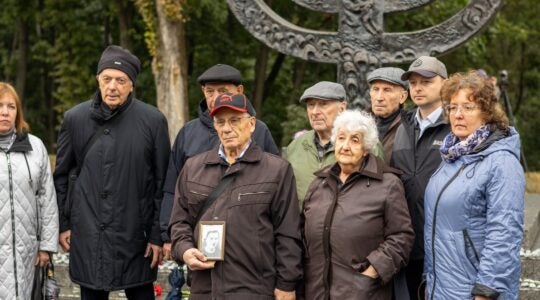
Scenes from “Make Jewish Babies,” a film about Birthright Israel produced and aired on the Dutch Jewish Broadcasting Company in 2012. (Jewish Broadcasting Company)
AMSTERDAM (JTA) — The Birthright Israel phenomenon arrived only last year in the small Jewish community of the Netherlands. With only 250 Dutch Jewish alumni, few here knew much about the program, which has brought 300,000 young Diaspora Jews on free 10-day group trips to the Jewish state.
And that’s the way it might have remained if not for a documentary, “Make Jewish Babies,” that aired in early 2012 by the Dutch Jewish Broadcasting Company. The film, which follows the Birthright experience of three sisters from Amsterdam, sparked a fierce debate in the Netherlands. Some said the program inspired participants to be proud Jews; others decried it as a nationalist propaganda exercise.
But the same year, two locals groups and a philanthropist started planning the first all-Dutch Birthright delegation.
The documentary demonstrates not only the Dutch Jewish Broadcasting Company’s importance to Holland’s Jews — but also what could be lost when the Dutch government implements its plan to withdraw the $1.2 million it provides annually to the broadcaster, known locally as Joodse Omroep, or JO.
“The threat of excluding us from public broadcasting is terrible and shakes the community’s internal feeling of safety in their identity, which is necessary for openness toward other identities,” said Awraham Soetendorp, the country’s chief Reform rabbi. “It will banish the community’s soul.”
Dutch Jewry received its own broadcasting company 40 years ago with the establishment of NIK Media. In 2005, the outfit became JO, currently the only publicly funded Jewish broadcaster of its size in Europe, offering 70 hours of radio and 23 hours of television annually along with a website containing news and archived programs. JO’s five staffers run the operation out of a humble studio in Hilversum, Holland’s media capital, with an annual budget of just $1.2 million, provided entirely by the Dutch government.
Local Jews say JO provides a vital platform for community members to talk to one another and to Dutch society at large, while also providing an avenue for Jews outside Holland’s major cities to stay connected to the community.
On Dec. 6, the Dutch government announced it would cut the annual $18 million that it gives to nine religious broadcasters, including JO, as part of a wider effort to reduce the government’s culture expenditures. Broadcasters that wish to continue to receive public funds must sign up 50,000 subscribers each by 2016 and reapply.
For other religious communities, this probably won’t be hard. There are over 1 million Muslims in the Netherlands, 170,000 Buddhists and at least 90,000 Hindus — and each of those groups has their own broadcasting service, two in the case of Dutch Muslims. But Holland’s Jewish community of 40,000 stands little chance.
“The government’s decision therefore spells certain demise only for JO,” said Bart Wallet, a historian at the University of Amsterdam and an expert on Dutch Jewish history.
The singular impact of the government’s decision on the Jewish community has led, perhaps inevitably, to public discussion of the Holocaust, in which 100,000 Dutch Jews were killed. Even among critics of subsidized media, the argument that special dispensation should be provided to Holland’s Jews has resonated.
“Generally speaking, our taxes shouldn’t go to spreading religion, but I would make one exception here, and that is in the case of the Jews,” Prem Radhakishun, a Surinam-born Hindustani television personality said recently in a prime-time television appearance. In relative terms, he said, “more Jews were murdered here than elsewhere in Europe, and we have a moral debt to Jews.”
But for some Jewish leaders, such appeals to Holocaust guilt are discomforting.
“I don’t want to immediately go all the way back to the Shoah,” said Alfred Edelstein, director of the JO. “The JO is important for Jewish life here and now, for the community and especially for people who live in small towns, for whom it is a way to stay connected.”
Given such sensitivities, Dutch authorities have been reticent to comment directly on JO’s fate. In a televised discussion on Dec. 9, State Secretary for Education, Culture and Science Sander Dekker declined to comment on any “specific program or network.” But Dekker added that “very specific and complicated issues that concern very few Dutchmen should not be the first place that public funding goes.”
Nevertheless, Edelstein remains hopeful that a place can be maintained for Jewish broadcasting in the Netherlands, perhaps by housing JO at one of the larger broadcasting groups. Edelstein said he will raise that possibility in a meeting with government officials on Jan. 16. But Wallet is less optimistic.
“I don’t know which broadcaster will want to be Santa Claus for the JO, which only costs money and brings nothing in,” Wallet said. “I’m afraid all Dutch media are feeling a serious pinch right now and I’m not sure at all a satisfactory solution will be worked out.”
JTA has documented Jewish history in real-time for over a century. Keep our journalism strong by joining us in supporting independent, award-winning reporting.





